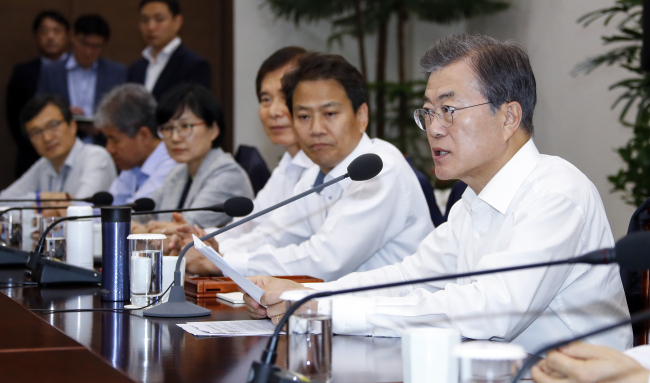President Moon Jae-in on Monday stressed the need to reduce working hours, saying it is a means to improve the quality of life and create jobs.
Revised regulations limiting working hours to 52 hours per week -- 40 regular hours with 12 hours of possible overtime -- came into effect Sunday.
 |
President Moon Jae-in speaks at the weekly meeting with top aides at Cheong Wa Dae on Monday. Yonhap |
“(The) working-hour reduction began yesterday. It will be an important opportunity in moving on from an overworked society and finding oneself, and being with families,” Moon said at a weekly meeting with senior presidential aides.
This was Moon’s first official schedule since Wednesday, when his schedule was cleared due to a cold. Cheong Wa Dae said at the time that the cold was brought on by fatigue.
“As can be seen from the examples of Germany and other countries, (reducing working hours) is the surest and most effective measure for sharing jobs.”
Moon went on to say that reducing working hours leads to increased productivity, citing research by the National Assembly Budget Office. According to Moon, the study projected that a 1 percent drop in working hours leads to a 0.79 percent increase in productivity.
With 2,069 hours spent working each year, South Korea has one of the longest working hours, and one of the lowest productivity among Organization for Economic Cooperation and Development member states.
The new measures are applied to workplaces with more than 300 employees, central and local government employees and state-run organizations
Workplaces with between 50 and 300 employees will become subject to the new rules from Jan. 1, 2020, and those with between five and 50 workers are affected from July 1, 2021. Employers could face up to two years in prison or a fine of less than 20 million won ($17,900) for violating the new regulations.
Under the new regulations, an employer is in violation if a worker is required to work more than 12 hours of overtime in one week, even if the total comes to under 52 hours.
Moon went on to say that the reduction in working hours is a step toward curbing industrial accidents and toward “addressing an embarrassing reality” that Koreans are required to work 300 hours more than the OECD average.
The president also said that the decision to hold off penalties for breaking the new regulations for six months decreased the burden on businesses, and urged his aides to roll out follow-up measures.
The country’s corporate community, however, says that the six-month grace period is far from a fundamental solution, and is calling for a wider application of the flexible working hour system and other measures that give businesses more leeway.
The flexible hour system allows workplaces to avoid penalties as long as the weekly total comes to under 52 hours regardless of whether the daily limit is breached on a particular day.
By Choi He-suk (
cheesuk@heraldcorp.com)






![[Exclusive] Hyundai Mobis eyes closer ties with BYD](http://res.heraldm.com/phpwas/restmb_idxmake.php?idx=644&simg=/content/image/2024/11/25/20241125050044_0.jpg)
![[Herald Review] 'Gangnam B-Side' combines social realism with masterful suspense, performance](http://res.heraldm.com/phpwas/restmb_idxmake.php?idx=644&simg=/content/image/2024/11/25/20241125050072_0.jpg)
